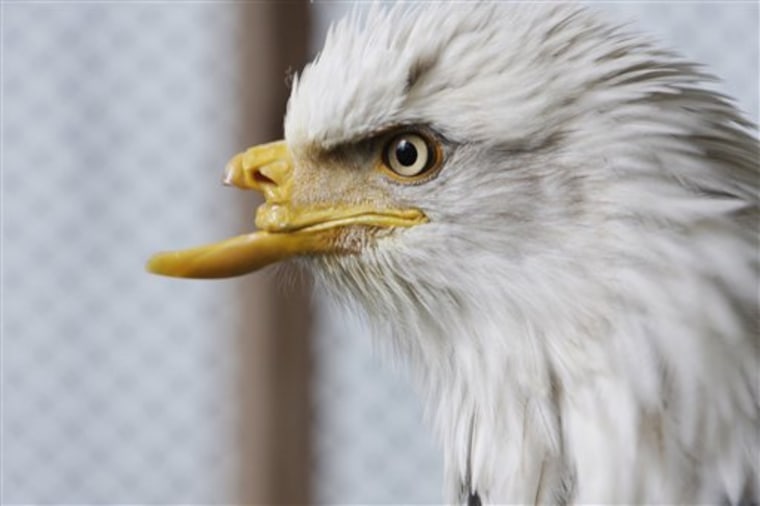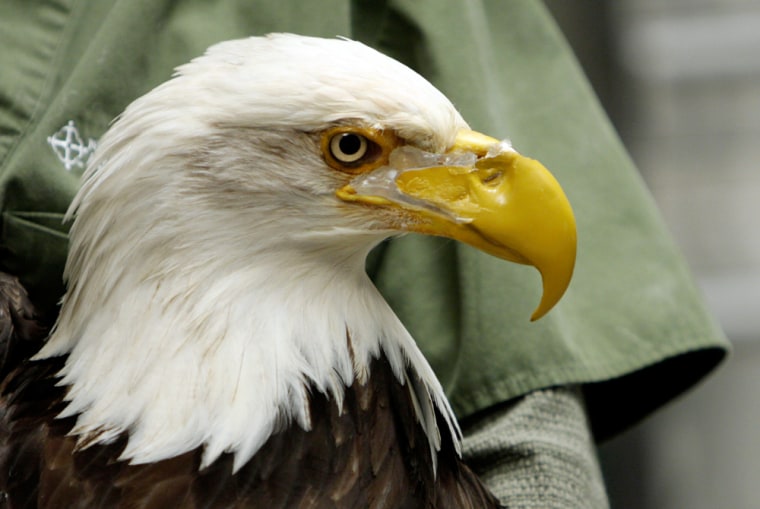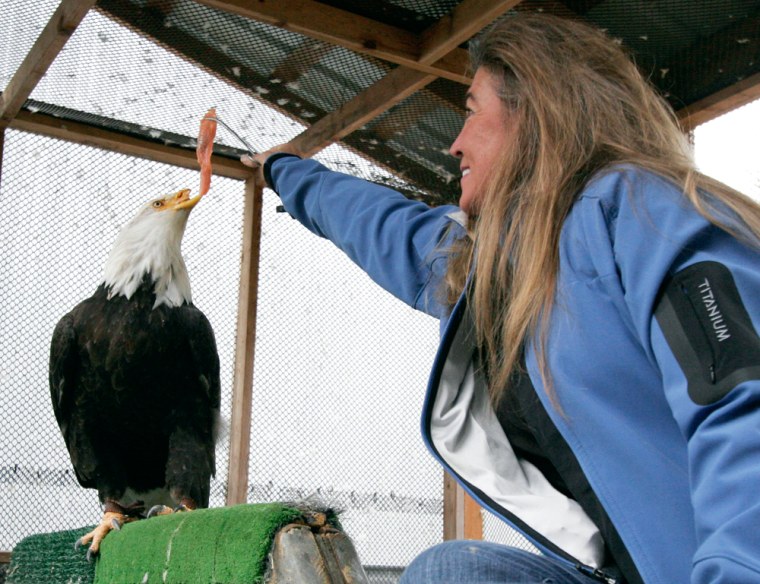More than three years after a poacher shot off her upper beak, a bald eagle named Beauty can finally live up to her name — with the help of volunteers.
More than three years after a poacher shot off her upper beak, a bald eagle named Beauty can finally live up to her name — with the help of volunteers.
A team attached an artificial beak to the 15-pound eagle in mid-May, improving her appearance and, more importantly, helping her grasp food.

“She’s got a grill,” joked Nate Calvin, the Boise engineer who spent 200 hours designing the complex beak.
The “grill” was exposed when a bit of the synthetic beak broke off during application. But the new beak is only a temporary fix, designed to nail down precise measurements.
A final beak made of tougher material will be created and attached later, though her saviors don’t plan to release her back into the wild. They say that she has spent too much time with humans that the final beak will still not be strong enough to tear flesh from prey.
But getting this artificial beak now was key to Beauty’s survival. A wild eagle that must be hand-fed by humans would eventually have to be euthanized, especially since her life span could run four more decades, said Jane Fink Cantwell, who took Beauty to her raptor recovery center in Idaho two years ago.
Scrounging for food
The bird was found in 2005 scrounging for food and slowly starving at a landfill in Alaska. A bullet had taken from her curved upper beak, leaving her tongue and sinuses exposed, with a stump useless for grasping food. Cantwell said eating with her beak was like using one chopstick.

She also had trouble drinking and couldn’t preen her feathers
Beauty was taken to a bird recovery center in Anchorage, where she was hand-fed while her caretakers waited in vain for a new beak to grow. Cantwell in 2007 agreed to take the eagle to her Birds of Prey Northwest ranch. Every day she used tongs to feed Beauty food, such as strips of salmon.

During a speaking engagement in Boise, she met Calvin, who offered to design an artificial beak.
“As an engineer, as a human being first, I was interested in helping it out,” Calvin said.
Molds were made of the remaining beak and scanned into a computer so the artificial beak could be created accurately.
The nylon-composite beak will help the bird drink and grip food.
Questioned by critics
Some critics question such an extraordinary effort to save one bird that is no longer on the endangered species list. But Cantwell pointed out that Beauty has the potential to breed or be a foster mother to orphaned eagles.

Cantwell also plans to use the bird at lectures around the country to teach people not to shoot at raptors.
The procedure took place in the garage of Cantwell’s neighbor, in front of reporters and guests.
Beauty was laid on her back, fully conscious, with a ribbon of veterinary wrap around her wings. Her talons were wrapped in a leather strap.
“Everybody better be still and quiet,” Cantwell told visitors. “Let’s be mindful she’s a nervous, wild animal.”
A gold and titanium pin was glued to the remnant of her upper beak to serve as the guide for sliding the artificial beak into place.
Delicate procedure
The volunteers moved slowly and talked softly as they slipped the beak on and off, making minor adjustments. A grinder, sander and scissors were used to trim both the artificial beak and the existing remnant of upper beak. The bird sometimes nipped harmlessly at their hands.
About an hour and a half into the procedure, Beauty lurched upright and spread her wings, snapping the wrap. She hovered above the table, screeching, with Cantwell and the other handler holding the leather straps.
After a couple of minutes, they calmed the eagle and got her back onto the table, then completed the procedure.
The Boeing Co. and a maker of synthetic skin in California have volunteered to help make the permanent beak.
After the surgery, Cantwell cradled the eagle and prepared to return Beauty to her aviary, saying: “The eagle has landed, and she has a beak.”


